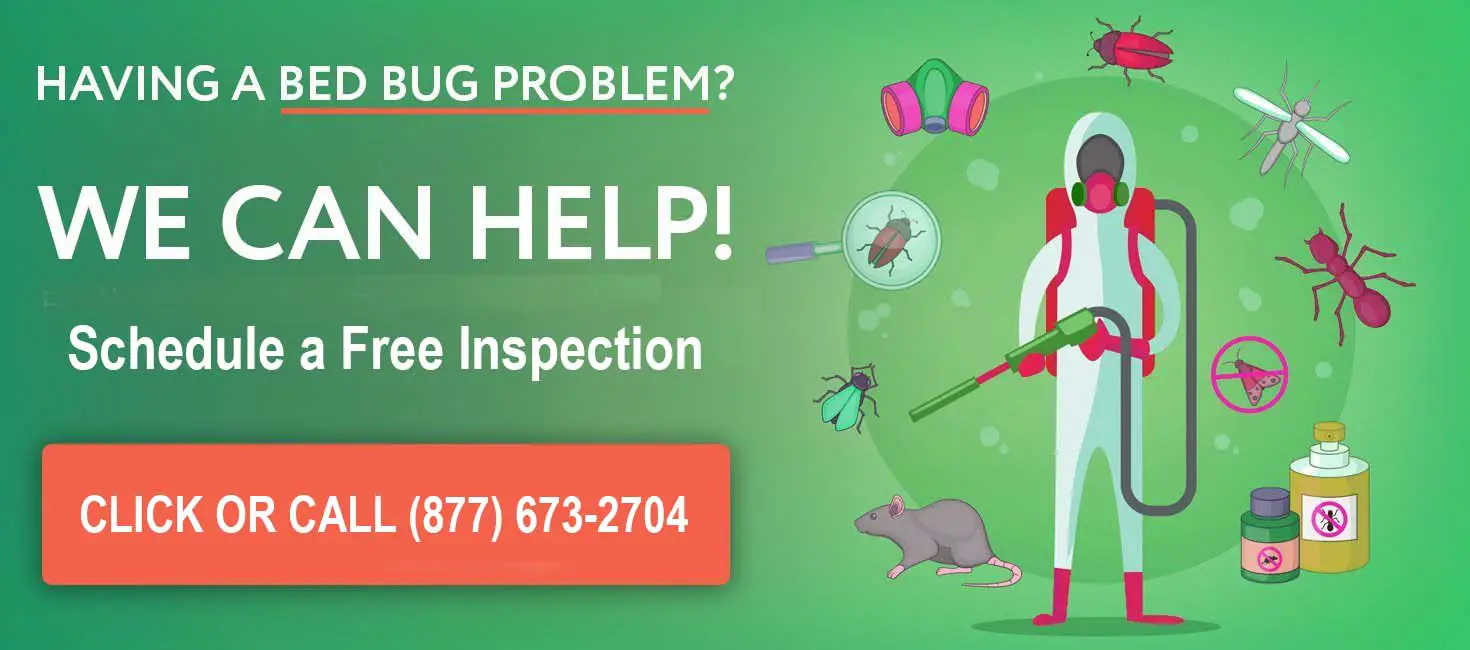Overview
Each of the following pictures of bed bug bites shows typical skin reactions to the insect's saliva. Most people are not hypersensitive to the bites and will show no reaction at all with the exception of two small dots where the bedbug punctured the skin. Other people can develop more severe symptoms such as red papular eruptions (raised inflamed areas) or in severe cases, blisters.
Most bites will have a small clear area in the center surrounded by redness that may or may not be raised. People tend to become more sensitive and have larger reactions after each episode. Reactions can include itch, swelling, rash, and wheals (large round red area on the skin). Severe reactions can cause skin blisters and trouble breathing, although these reactions are very rare.
Skin reactions can occur immediately, hours, days or even up to two weeks later. Itch, the primary symptom beyond a red raised area, should subside in 1 to 3 days. Bed bug bites should go away with no treatment in 4 to 7 days.
Because individual allergic skin reactions can vary as shown in the following bed bug bite images, and people can become more or less sensitive to bed bug bites over time, bites alone cannot confirm the presence of bed bugs. Also look for other factors such as actual insects or blood and fecal stains on a mattress. Research shows that 11 out of 24 people have no reaction when first bitten. However, when bitten again most developed a skin reaction.(1)
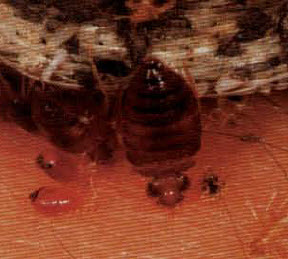 Picture of Bed Bug Feeding on Skin. Adult Bed Bugs are About the Size of an Apple Seed
Picture of Bed Bug Feeding on Skin. Adult Bed Bugs are About the Size of an Apple SeedIf you skin symptoms match any of the pictures of bed bug bites, look for other signs of an infestation.
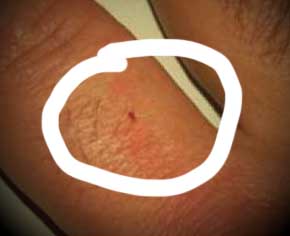 Bed Bug Feeding On Hand
Bed Bug Feeding On HandPictures of Bed Bug Bites on Humans
When people ask "show me pictures of bed bug bites" they are often thinking that all bites look the same. The reality is that reactions are different in each person.
Bed bugs bites will appear on areas of the body that are exposed during sleep. The most common areas are the legs, arms, shoulders, and neck. The bite itself will feel like a tickle or pinch. Patterns are often in a straight line.
Said another way, if you see bites only under areas that are covered in clothes, and you see no other signs of an infestation such as live insects or mattress stains, in all likelihood the skin reaction you are seeing IS NOT caused by bed bugs.
Do not scratch the bites as it can cause a skin infection. Bite reactions can occur immediately or in a few days.
Typical Allergic Skin Reactions
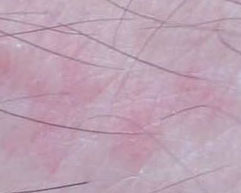 Bed Bug Bite Skin Reaction After 30 Minutes on Lower Leg
Bed Bug Bite Skin Reaction After 30 Minutes on Lower Leg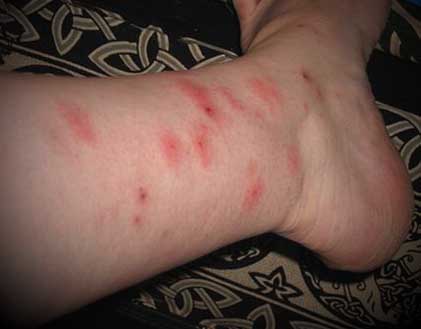 Bed Bug Bites on Leg
Bed Bug Bites on LegBed Bug Bite Patterns
It is common to see bed bug bites in a row of 3 or 4 bites or a cluster. This could be due to an arm or leg resting on an infested mattress seam.
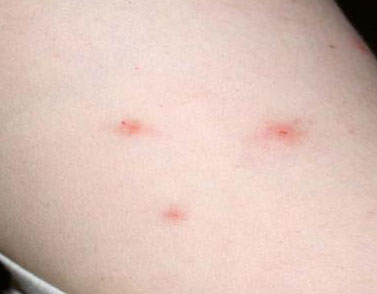 Bed Bug Bite Pattern on Arm
Bed Bug Bite Pattern on ArmBed bug bites can appear individually, in groups or in rows.
What do Bed Bug Bites Look Like on Arms?
Bed bug bites most commonly are found on exposed skin areas during sleep such as the lower legs, shoulders, and arms.
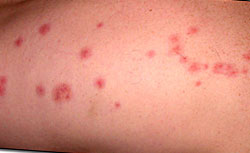 Cluster of Bed Bug Bites on Arm
Cluster of Bed Bug Bites on Arm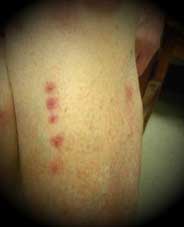 Bed Bug Bites In a Row. Could be caused by leg leading against mattress seam where bedbugs are hiding.
Bed Bug Bites In a Row. Could be caused by leg leading against mattress seam where bedbugs are hiding.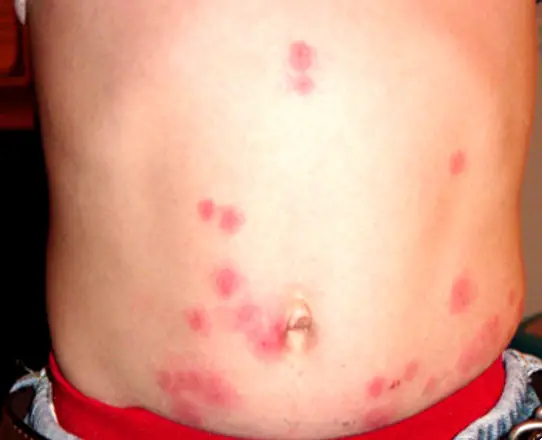 Bed Bug Bites on Stomach. Bites are typically 2mm to 5mm. Bites are referred to as erythematous ( redness of the skin or mucous membranes due to the accumulation of blood in dilated capillaries) or maculopapular (flat, reddened area of skin present in a rash) lesions.
Bed Bug Bites on Stomach. Bites are typically 2mm to 5mm. Bites are referred to as erythematous ( redness of the skin or mucous membranes due to the accumulation of blood in dilated capillaries) or maculopapular (flat, reddened area of skin present in a rash) lesions.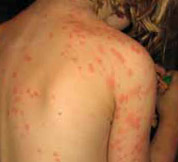 Back of 4 Year Old Bitten by Hundreds of Bed Bugs. Quantity of Bites Make Skin Look Like a Rash Instead of Bites
Back of 4 Year Old Bitten by Hundreds of Bed Bugs. Quantity of Bites Make Skin Look Like a Rash Instead of BitesBed Bug Bite Wheal Skin Reaction
The Bed Bug bite wheal pattern see below is usually seen in people that that have had other bed bug bite episodes and are now more sensitive to the bites.
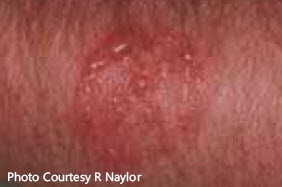 Bed Bug Skin Wheal Reaction
Bed Bug Skin Wheal ReactionAuthor: R. Naylor
The size of the skin reaction depends on the allergic response of the individual. Hypersensitive individuals will have larger reactions.
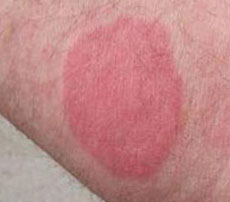 Bed Bug Wheal Skin Reaction
Bed Bug Wheal Skin Reaction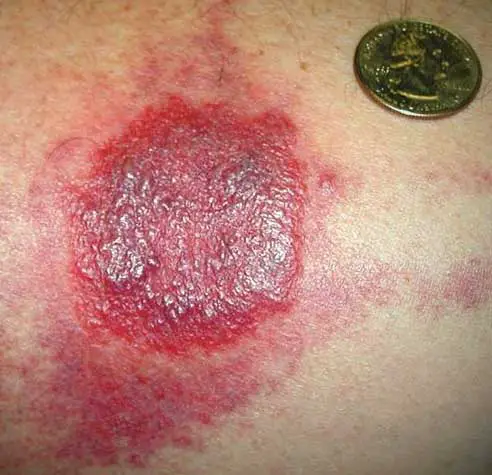 Bed Bug Bite on Leg - Wheal Reaction
Bed Bug Bite on Leg - Wheal ReactionBlister Reaction
In advanced cases bed bug skin reactions can turn into blisters.
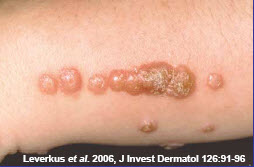 Picture of Bed Bug Skin Blisters
Picture of Bed Bug Skin BlistersAuthor: Leverkus
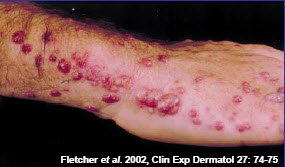 Bed Bug Bite Blisters Hypersensitive Reaction
Bed Bug Bite Blisters Hypersensitive ReactionStages of Bed Bug Bites
Bed bug bite images vary based on the individual and how allergic they are.
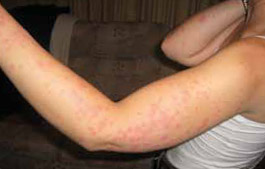 Bed Bug Bites 4 Days After Being Bitten
Bed Bug Bites 4 Days After Being Bitten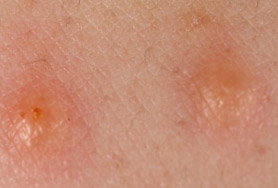 Bed Bug Bite 1 Week After Being Bitten on Skin
Bed Bug Bite 1 Week After Being Bitten on SkinDiagnosis
Bed bug bites alone can look like bites or rashes from other causes. A Doctor will need to eliminate the following before making a definitive diagnosis (unless you have proof of other signs in the home such as a live insect or a stained mattress).
- Chicken Pox
- Staphylococcus infection
- Spider or Mosquito Bites
- Hives
- Allergies to food
- Reaction to medications such as antibiotics
- Scabies
Bed Bug Bites Treatment
Treatment for bedbugs bites involves addressing itchy bites, soothing the skin, and then preventing any infection. After Bite makes an anti-itch anti-microbial gel formula that is specifically formulated to provide relief bed bug itching and to promote healing.
In most cases, medical attention will not be needed if you have been bitten. For severe reactions or if you have difficulty breathing, immediately seek emergency medical care.
If the bed bug bites aren't healing, or you see signs of puss or infection, be sure to see a Doctor.
Tell-Tale Signs of Bed Bugs
Do not rely only on bite symptoms when determining if you have a bed bug infestation. Bed bug bites look like bites from other common insects. Skin reactions can be caused by insect stings from fire ant stings, insect bites from spiders, mosquito bites, and scabies to name a few. Other causes include skin irritation from exposure to household chemicals or some type of allergy.
If you believe you have bed bug bites, properly identify the problem by looking for other signs of an infestation. There are four signs that when taken together, help to differentiate bed bug bites from those made by other insects such as mosquitoes. These include:
- Pattern: Middle of the bite is clear with a red ring around the middle.
- Symptoms: Most bites are very itchy
- Location: Bed bugs do not bite through clothing and only bite exposed skin. This includes the arms, legs, shoulders, and neck. Bites are rarely seen on the bottoms of the feet. If this is the location of the bite, see a doctor and ask if the condition is scabies.
- Presence of Actual Bed Bugs: You can see baby bed bugs and adult bed bugs with the naked eye. Use a credit card or thin brush to work through the mattress seam to see if you dislodge any insects. It might be helpful to have a flashlight and magnifying glass. You can also spot small overall off-white bed bug eggs attached to rough surfaces. Note that bed bugs can change in appearance as they absorb human blood.
- Signs on the
Mattress: Small brown spots on a mattress (bed bug feces) or small blood spots could indicate the presence of bed bugs. Of course, spotting the bugs themselves is a sign. They hide in the seams of the mattress. Even one bed bug can cause a problem. Other areas where bed bugs are commonly found include around the headboard, night tables, and crevices between the walls and floor.
 Picture of Bed Bug Stains on Mattress
Picture of Bed Bug Stains on MattressWhy You Need a Bed Bug Professional
Do not only rely on pictures of bedbug bites to confirm that bed bugs are your problem. For example, bites that occur only on the bottoms of the legs are more likely to be flea bites.
Call in a professional that knows how to spot an infestation that might be in the walls of your home or hidden in a bed frame.
We recommended using the exterminators registered with Home Advisor. You can also call eLocal at 1.877.673.2704 for a pest control expert near you. Members of these networks are licensed and reviewed. There is no charge to receive a quote. You can also look at our directory of bed bug pest control experts.
Protect Yourself From Bed Bugs
Until you treat your home, minimize bare skin to cut off the bed bugs' food source. At night wear socks over the bottom of pajamas and mittens over shirt sleeves. Keep your bed away from other furniture and blankets off the floor.
Brochures
Each of these free brochures is filled with pictures of bed bug bite examples such as photos of rashes, skin reactions, mattress signs, and information.
References
(1) Reinhardt K, Kempke D, Naylor R, Siva-Jothy MT. Sensitivity to bites by the bedbug, Cimex lectularius. Med Vet Ent 2009;23:163–6.
(2) Bed Bugs (Cimex Lectularius) and Clinical Consequences on Their Bites; Jerome Goddard, PhD and Richard deShazo MD
